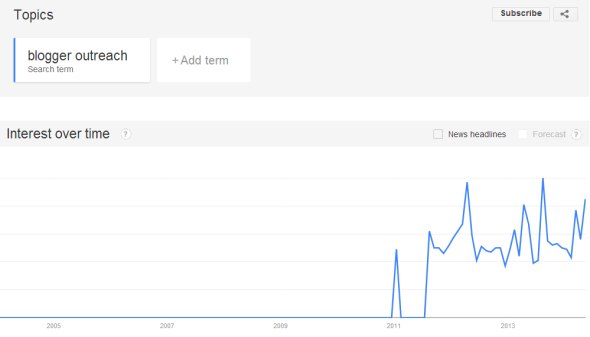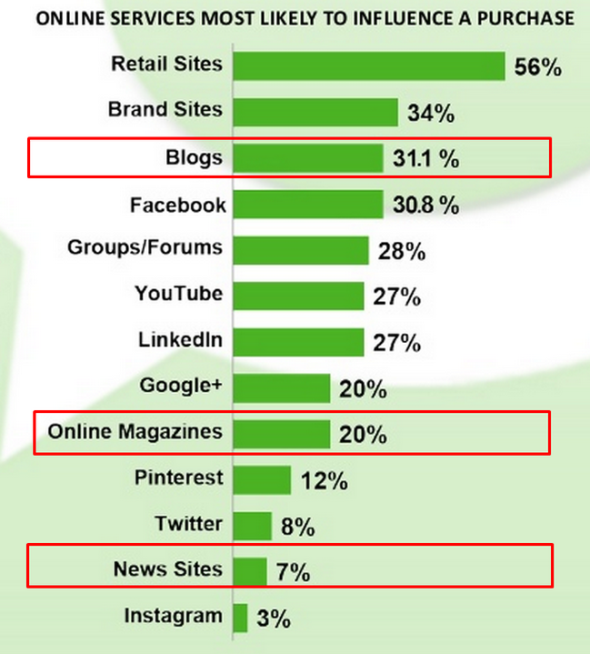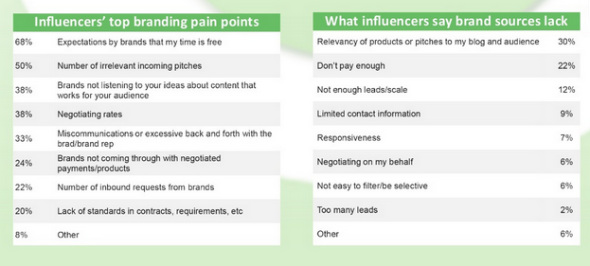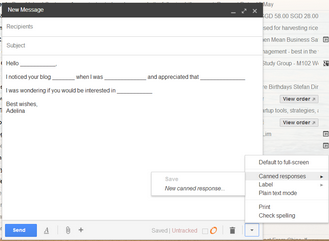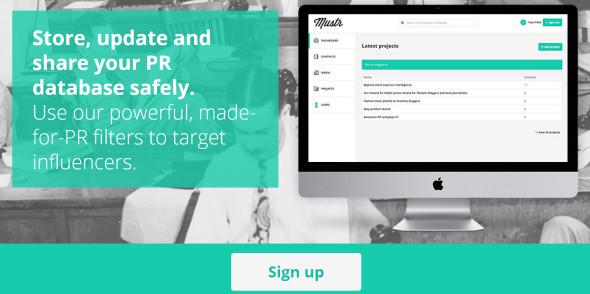Blogger Outreach campaigns have gained popularity lately. And while most resources out there are for newcomers, a PR expert needs a slightly different guide in order to handle them together with the day to day media relations. And here it is: all the useful information about blogger outreach campaigns a PR expert needs.
“So it seems bloggers are climbing their way up to the top of important content producers. But what hasn’t changed is that reaching out and tactfully forming relationships with these modern influencers who can cause action over awareness is something PR professionals have been doing for years.
Because of this, PR pros have an advantage over some of the brands who are jumping on the blogger outreach train. They understand the importance of nurturing relationships, having a two sided relationship and recognizing advocacy—key components of blogger outreach.” said Kristen Matthews, Content Marketer at GroupHigh, on this SocialMediaToday article.
However, even if blogger outreach campaigns seem to be easier to be taken care of by PR experts, they should be treated with care as they sometimes fall on the thin line between earned and paid media. This article will therefore focus on the real PR work behind blogger outreach campaigns, and not on the marketing side of it (that includes paid referral links, paid posts etc.)
How can blogger outreach campaigns help a PR expert?
Although a PR role should cover all sorts of media relations, the most attention goes to journalists. However, bloggers have found their ways to the eyes and years of customers at a scale that should put them on PR pro’s high priority already.
Here is a hint: bloggers have a higher influence on consumer purchases than online magazines and news sites, according to Technorati 2013 Digital Influence Report. As it seems, blogs have a 31% influence over consumer purchases, while online magazines have 20% influence and news sites have 7% influence.
Bloggers have two main advantages over journalists:
- Bloggers are usually very focused on niches. Hence it is easier to reach specific groups of people with specific interests through them. Although the reach is smaller through blogs than through traditional media, the segmentation possibilities can lead to great campaign results.
- Bloggers usually have very engaged communities of readers. Hence their influence is not to be underestimated. The relationship between the writer and its readers is way higher when it comes to bloggers than when it comes to journalists.
But there is also one main disadvantage in comparing the two: bloggers don’t have the skills of journalists, and sometimes not even the same ethics. Bloggers can write following no journalism rules. Sometimes they are not familiar with handling relationships with brands and PR experts. And since they are not paid for their work by a media house, they might want to monetize their efforts in helping brands grow. But hey, more blogger outreach campaigns done right can only educate them and the future might get quite interesting.
Most common uses of blogger outreach campaigns are about:
1) Having bloggers write about a brand or campaign
Some notable examples of successful blogger outreach campaigns (of pure PR work, not paid ones) were:
- In February 2013, Ford gave away 100 Ford Fiesta for 6 months to 100 bloggers and social media influencers in return of their documented experience shared with the world. (read more)
- In May 2013, Ariel Brazil sent design items covered in stains and a sample of Ariel stain remover to influential fashion bloggers. (read more)
- In July 2013, Marriott hotel in Florida invited 13 top travel bloggers to their locations, giving them personalized holiday packages to experiment. (read more)
- In December 2011, Orange Spain prepared the launch of its service ON Voicefeed by inviting the local top tech influencers to meet the team behind and to be beta testers for the app for a month. (read more)
- In late 2010, Vodafone gave Vodafone VIP to one passionate fashion blogger that was not a top blogger yet, which granted him access to London Fashion Week AW11, an event sponsored by the company. (read more)
2) Inviting bloggers to events to cover launches, interview speakers and experience products and services
As some conferences invite bloggers to be Official Bloggers, brands jump in to give them interesting content or products and services. For example, during Next Conference that took place in Berlin 2012, Airbnb offered free accommodation to the Official Bloggers. (read more)
How to choose who to target for blogger outreach campaigns?
Sometimes you can target bloggers just like journalists, by the industry and topics covered. Sometimes, you can target bloggers just like celebrities, by the lifestyle they promote (and if it fits the brand image).
Then the research should dive into their potential reach. With bloggers, it is very unlikely that they mention the size of their audience, as opposed to other media. And as a matter of fact, you shouldn’t even care about it. Look into bloggers that have very engaged communities in their niche, by assessing the blog comments and social media interactions.
And finally, you might want to check if they are open to any approaches by brands. Check if they have previously covered any brand products or campaigns and how. Check if they covered competitors and from what perspective. And check if they have any published info about their position towards blogger outreach campaigns and the like. And especially if they expect any remuneration (as you don’t want that in PR).
As for tools to make the search easier, we recommend: Google Blog Search, Scraper Chrome Extension (free) and typing “site:examplewebsite.com [at] [dot]” in google searches in order to find email addresses.
How to approach bloggers for a blogger outreach campaign?
As a PR expert, you are used to the fact that journalists don’t want to be treated as lists, and surprise surprise neither do bloggers. Hence the targeting research is very important to filter them because each blogger will require your time to build a relationship.
PR agencies need to be billing their clients to develop relationships with bloggers too on a retainer basis, so that they will be approachable whenever necessary.
Then you might also need to know what motivates bloggers to join campaigns – the most attractive ones are not paid:
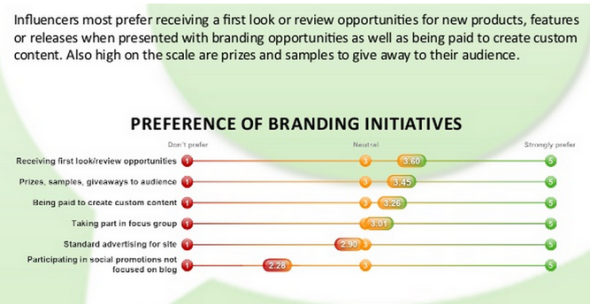
Before any approach, you might want to consider building a Blogger Outreach Code of Ethics that can be a reference for the bloggers. Ogilvy has a simple and short one that you can use as inspiration. One part it covers is the monetization issue that might arise when dealing with bloggers (as stated previously):
“If we reach out to you with news about a product, campaign or issue, we will not provide monetary compensation, because we believe it is unethical to “buy” favorable reviews and not want to appear as if we are.
If you have advertising opportunities on your blog, we will counsel our clients to consider purchasing advertising as a way to reach your readers. We will make it clear, however, that paying for advertising does not mean that you will post about the campaign or that, if you do, you will do so in a way that is favorable to them.
If we ask you to review a product and, therefore, provide you with the product to enable you to “experience” it, we will ask that you be transparent and reveal that you have been given the product temporarily, or permanently.
If we engage you as an advisor on a specific project, we will consider providing you with compensation (agreed upon at the start of the project). This compensation will solely be for your time as an advisor and will not include an expectation that you will write about the project – favorably or unfavorably.”
For a first reach out (preferably after already reading and commenting on their blogs), here are 9 examples of blogger outreach approaches and their analysis.
To simplify these email approaches, you can use Gmail Canned Responses that allows for setting a template email and just adding some info for personalizing them. Canned Responses are to be turned on in Gmail from Settings / Labs, then you need to write the template as a new email and save it as a Canned Response from Options (at the top right of the Send button). Each time you approach a new blogger, you can start from the template including the greetings, campaign and brand info and then add the bloggers name, blog name, links to its articles, personalized reason for approach etc.
Also, you might want to use Signals to get notifications on who opened your email and when. The tool is free to use for up to 200 notifications per month. In most cases, if a blogger opens an email and doesn’t reply, he/she is probably not interested. You can try following up, but you might just let it go. For all those who didn’t open, definitely follow-up.
Then once the relationship is established, add the bloggers into your media database by using Mustr. Like this you can share the list with the project team or with the client, you can save notes and you can send them the campaign details with high resolution images and other attachments.
How to measure the results of a blogger outreach campaign?
You can check the brand’s website traffic brought by the bloggers by using Google Analytics (free tool that most websites have in place). There are two ways to track the effects:
- Use URL Builder to set up links with tracking codes to give to the bloggers that accepted participating in the campaign. Then Google Analytics will display the aggregated traffic from all bloggers, as well as traffic from different set segments.
- Use Google Analytics Segments to setup a segment for a specific source (in this case, a specific blog). In case people don’t convert on the spot, in the first visit to the website (like in the case of cars, for example), this tracking way allows to know what traffic came for the first time ever from a blogger, even if afterwards they come directly to the website.
Also, you might want to use a backlink checker tool and google alerts to be notified of any brand mentions and links to the website.
We wish you all the best with your next blogger outreach campaign! And please, do share your experience and learning.

